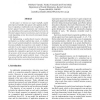Free Online Productivity Tools
i2Speak
i2Symbol
i2OCR
iTex2Img
iWeb2Print
iWeb2Shot
i2Type
iPdf2Split
iPdf2Merge
i2Bopomofo
i2Arabic
i2Style
i2Image
i2PDF
iLatex2Rtf
Sci2ools
131
click to vote
ICMAS
1998
1998
Implementation Issues on Market-Based QoS Control
In this paper, we discuss two major tradeoffs, spatial and temporal tradeoffs, that appear when applying marketbased computing to multimedia network applications. The former appears between computation and communication cost, depending on how agents are distributed over network. The latter appears between reactiveness and correctness of result, depending on how the network environment dynamically changes. By implementing a market-based resource allocation mechanism to a desktop conferencing system, we clarified that (1) as for spatial tradeoff, the centralized computation becomes profitable in proportion to the number of clients, and that (2) as for temporal tradeoff, the merit to respond quicklyto the change of the environment by prematurely terminating the computation supersedes the merit to improve the accuracy of the resource allocation by performing the calculation until the market perfectly clears. It has also been proved that the market-based mechanism can achieve efficient all...
Related Content
| Added | 01 Nov 2010 |
| Updated | 01 Nov 2010 |
| Type | Conference |
| Year | 1998 |
| Where | ICMAS |
| Authors | Hirofumi Yamaki, Yutaka Yamauchi, Toru Ishida |
Comments (0)

